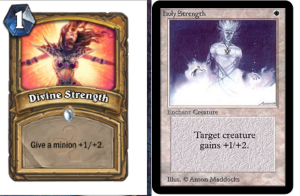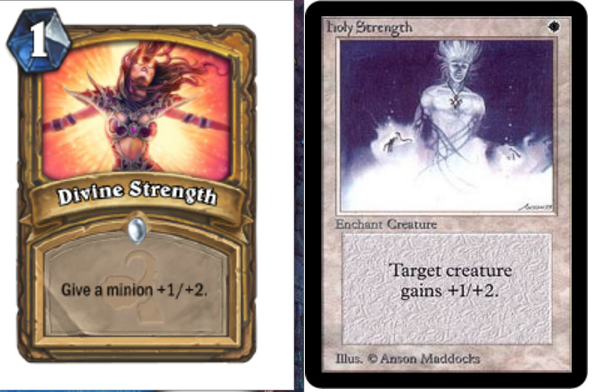
I am of course a long-time Magic the Gathering player. Over the past year or so I’ve also been playing Blizzard’s digital CCG Hearthstone (limiting myself to free to play since who has money to spend on two CCGs?) and I’ve been thinking about the design parallels and differences between the two. If you’re a Hearthstone player, you’ve probably read a lot of these things before, since many well-known pros play both MTG and HS. This is written more towards the Magic player in mind to get to know Hearthstone.
Mana system and Mulligans
Like most modern successors to MTG, HS does away with the concept of “mana screw” by automatically providing one generic mana to each player per turn. It’s really MTG’s big weakness and what turns off many players. MTG Head Designer MaRo tries to justify the existence of mana screw here. HS’s mana system is much simpler, and has no concept of colors or mana screw or color screw. One disadvantage of this is that all costs are the same, and they have to restrict deck access to cards via another method – class-specific cards. This makes it impossible to have the equivalent of a “multicolor deck” like in Magic, which means there are theoretically fewer possible deck archetypes in HS for a comparable set of cards.
I’m a fan of Hearthstone’s mulligan system – selectively sending back particular cards from your opening hand – as opposed to Magic’s sending back the entire hand. Unfortunately, Magic is already balanced around the current mulligan system, and it will probably have issues if you only have one chance to mulligan and still draw no lands.
Hearthstone Limitations
Hearthstone is definitely a more limited game than Magic because it follows one important rule: you can’t interact during your opponent’s turn. This has the benefit of streamlining matches and making them go faster (no need for concepts like the stack and priority from MTG) , which is important for a game played online. The disadvantage is a greatly reduced design space which HS has to compensate with in other areas.
There are some other limitations to streamline/simplify gameplay:
- No graveyard (well, HS has a concept of “minions that died this turn” or “minions that died this game”, but there is no visible graveyard zone). This means Magic’s graveyard-based mechanics such as Flashback or Unearth can’t be translated to Hearthstone
- No manual searching through the deck. When an effect pulls something out of the deck, it’s always random
- At most 7 minions (creatures) on the board on each side
Strengths of the Digital Format
Despite the above limitation, HS does earn some additional design space since it takes advantage of the exclusively digital format in a number of ways not available to Magic, such as:
- Damage to minions not healed at EOT – in Magic, this would not have been practical since it’s a lot of effort for players to track the damage to individual creatures. For a digital game it’s easy since it can be done automatically. This also provides some mechanics that can’t usefully translate to MTG: the Enrage mechanic and effects like “Draw a card for each damanged minion”
- Effects can generate new cards – both spells and minions. Magic can do this too, through the use of “tokens” (but only for permanents, not spells). Magic’s tokens however are “second-class” permanents since they are not real cards. In HS, the generated cards are real cards that can be returned to hand, shuffled into your deck, etc. Furthermore, the generated cards can be either existing cards (whether you have them in your deck or not – Discover mechanic or effects like Piloted Shredder) or cards that are not even available for deckbuilding such as the Spare Parts generated by some mechs
- More randomly generated elements – Magic has some RNG too, but not nearly as much as HS. I believe that in both games, serious competitive players don’t like too much RNG.
- Effects can permanently boost cards not in play – this includes effects like “all cards in your deck get +1/+1” or “reduce the cost of this card for each turn it is in your hand”. This is possible since we can trust the game engine to correctly process and track hidden information
- **Board position matters **– minions can grant bonuses to adjacent minions, or effects can target the leftmost minion, etc. Actually, Magic can do this too, but given that they’ve moved away from “graveyard order matters” because it places too much effort on the player, I suspect they are not likely to do this for similar reasons
- **Easily balance existing cards **– Blizzard hasn’t done it too often, but they do issue nerfs to cards that are too powerful. Before the introduction of the Standard format they even nerfed some core cards to free up future design space. In Magic they try to avoid functional errata because they have no way of ensuring the ifnromation is propagated to all owners of previous printings of the same card
Hearthstone Mechanics
**Hero Power – **each hero has a power that costs 2 mana. The great thing about this it reduces the effect of “cost screw”, i.e. drawing high cost cards early, since your hero will always have a low-cost play available no matter what. There’s also some design space there they started using in earnest with The Grand Tournament expansion, such as the Inspire mechanic or effects that modify hero powers.
Secrets – to compensate for not being able to interact during the opponent’s turn, some classes have access to secrets – these are spells that generate effects during your opponent’s turn, based on particular triggers. The opposing player wouldn’t know
**Taunt **– the equivalent of Taunt in MTG is “Blocking”. Since you cannot do anything on your opponent’s turns, blocking the same way as MTG is impossible, so they have this mechanic to replace it. Currently, HS has no way for minions to bypass Taunt without removing the Taunt minion itself – there are no evasion mechanics.
**Charge **– the equivalent of MTG’s Haste. However, it is stronger here in HS since your opponent cannot interact during your turn. This means Charge creatures essentially get a free attack unopposed and can throw off your opponent’s combat math. This makes effects that grant Charge particularly strong. An example was the infamous nerf to Warsong Commander because granting Charge to other creatures enabled one-turn kills.
Divine Shield – no equivalent in MTG, but I think something can be worked out if needed. Something like:
Divine Shield (This creature enters the battlefield with a divinity counter on it. Whenever it takes damage and has a divinity counter instead remove a divinity counter.)
I’m actually a big fan of Divine Shield as a mechanic, it’s more interesting and a lot simpler than Magic’s defensive mechanics Protection or Regeneration
**Windfury **– this is basically the same as Magic’s Double Strike, except Magic is limited by the rules to two strikes, while HS has one card that has Mega-Windfury, allowing four strikes
**Overload **– this is HS putting its’ simpler mana system to good use. Overload allows you to “borrow” mana from the future to reduce the costs of your cards. The downside is you have less mana available next turn. The closest equivalent is probably Magic’s Echo mechanic or the “Pact” mechanic from the Pact of Negation cycle, although neither are exactly the same
**Combo **– this is the Rogue mechanic in HS, it grants an additional effect if at least one other card has been played in the same turn. This is easily implementable in Magic:
Eviscerate 1R Sorcery Eviscerate deals 2 damage to target creature or player. Combo – Eviscerate deals 4 damage instead
It’s no different than Magic’s other “enhancing” ability words like Morbid or Kicker which grant additional effects depending on certain conditions
Stealth – this is the same as Magic’s Hexproof, except Stealth wears off once the minion attacks, and stealthed minions can’t be attacked. The usage is generally the same – to protect your minion until it can actually gain you some value.
**Battlecry and Deathrattle **– in Magic, these are simply triggered abilities “when the creature enters the battlefield” and “when the creature dies”. If these were named keywords in MTG, it would open up some additional design space that HS already uses. MTG does use this design space sometimes, but the templating is difficult, see Torpor Orb. More complicated abilities like “Battlecry: Trigger another minion’s Deathrattle effect” would not be worth the effort to implement in MTG unless similar keywords are defined to make templating easier.
Spell Damage – this mechanic increases the damage dealt by burn spells. In Magic, such spells are almost exclusively red spells, so I’m not sure how likely it would be to keyworded in Magic. This design space has been used in MTG on occasion, but it’s mostly damage doubling instead of incrementing.
**Choose One **– I actually wasn’t aware this was a named mechanic until they took advantage of it with Fandral Staghelm. Magic’s modal mechanic has never been used in such a way, but imagine an effect like “Whenever you make a choice for a modal ability, you may choose one additional mode” – makes your Cryptic Commands way more awesome!
Silence – this is basically “remove all abilities” in Magic. To be truly equivalent, it should also remove power/toughness boosts and auras attached to the creature. Seems perfectly doable in Magic, although it might have memory issues, unless it’s as an aura.
Freeze – frozen minions can’t attack the next turn. It’s mechanically and thematically similar to tapping effects often found in blue and white cards. Freeze effects in HS can easily be replicated in Magic. The main difference is that frozen Taunts in HS can still “block” so Freeze can’t be used offensively to get rid of the “blockers”
Hearthstone is a pretty young game compared to Magic, but as far as I can tell it’s doing pretty well. It provides a fun, streamlined experience and takes advantage of the strengths of the digital format to overcome the weaknesses brought about by the streamlining. The monetization model is friendly enough that even cheap f2p players like me can appreciate it. So far Magic hasn’t had a real competitor in the paper space, but HS is a serious competitor in the digital space since it makes MTG’s digital offerings look terrible by comparison. Hopefully both games can learn more from each other and grow more in the future.


See Also